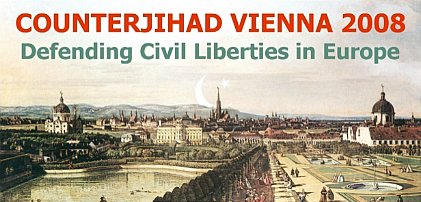
Slouching Towards Vienna
by Baron Bodissey
Tell me again about Europe and her pains,
Who’s tortured by the drought, who by the rains.
Glut me with floods where only the swine can row
Who cuts his throat and let him count his gains.
It seemed the best thing to be up and go.
— William Empson, from “Aubade”
For want of a better word, last weekend’s Counterjihad gathering in Vienna is referred to as a “conference”, but, as Dymphna mentioned in her report on Monday, the event was primarily a working meeting rather than a conference.
Last October’s conference in Brussels centered around the presence of a number of speakers, some of them well-known, who made informational presentations and then facilitated discussion. The results of the work in Brussels were carried to this year’s meeting in Vienna, where we rolled up our sleeves and really began to implement what was discussed last fall.
 We did have a featured speaker — Serge Trifkovic, the well-known author of anti-jihad books and articles — who spoke during the dinner on Sunday night. But even Mr. Trifkovic buckled down and got to work in the brainstorming and planning sessions during the workshop portions of the meeting.
We did have a featured speaker — Serge Trifkovic, the well-known author of anti-jihad books and articles — who spoke during the dinner on Sunday night. But even Mr. Trifkovic buckled down and got to work in the brainstorming and planning sessions during the workshop portions of the meeting.In addition to Mr. Trifkovic, there were a number of other bloggers and writers who took part in the event. Our Austrian correspondent E.S.W. was the local organizer for CJ Vienna and did a superb job as the hostess for the meeting, and she is also in charge of Mission Europa Netzwerk Karl Martell, on which the results of our work in Vienna are being posted. Check in there from time to time to see the papers and reports which are being published.
The German writer Stefan Ullrich was present, as were the German bloggers Christine Dietrich of Politically Incorrect and Holger Danske of Europe News.
Among the other bloggers were Aeneas of Beer n Sandwiches and Paul Weston, both of them from the UK. AMDG, who blogs at La Yihad en Eurabia and is a frequent correspondent here, attended the meeting, as did KGS of the Finnish blog Tundra Tabloids. Denmark was represented by Henrik of Europe News, Rolf Krake, and Zonka.
The rest of the participants were academics, journalists, ordinary working people, and retired folks. They came from Austria, the Czech Republic, Denmark, Finland, Flanders, Germany, Norway, Poland, Serbia, Spain, Sweden, Switzerland, the UK, and the USA. Most were Christians, but several Jews were present, along with one Buddhist and a number of secular people.
The one thing held in common — a prerequisite for attending — was that each person had to volunteer for at least one of the projects that were brainstormed during the two days’ sessions.
Last week, in one of the preliminary papers for the conference, I compiled a list of general categories of action that are appropriate goals for Counterjihad planning:
- Legislative initiatives, mounted locally or nationally
- Constitutional challenges to sharia law, or to the mandates of the EU and the UN
- Legal defense funds for people sued or criminally charged for speaking out.
- The formation of political parties
- Putting pressure on existing political parties to induce them to include anti-sharia planks in their platforms
- Public demonstrations
- “Street theater” events, such as the veiling of statues
- Media outreach
Although we covered a broad range of future actions, the particular focus of the Vienna conference was “Defending Civil Liberties in Europe”, so that the emphasis was on what would be called “First Amendment issues” if we were dealing with the United States.
When the Lisbon Treaty comes into full force at the beginning of next year, the existing laws and regulations imposed by the EU will be implemented and “harmonized” among the various member states. The legislation and diktats issuing from Brussels are deliberately lengthy, obscure, impenetrable, and hard to find, in order keep the average European in the dark about them.
The documents that list the mandates of the EU take up tens of thousands of pages of dense bureaucratese and were written by thousands of well-paid civil servants. Their job is to make official language incomprehensible, because stating the rules plainly would cause ordinary citizens to rise up in outrage.
This is particularly true of the laws affecting free speech. A Survey of Readings on Free Expression and Recent Laws and Resolutions was prepared in advance of the Vienna meeting to give the broad outlines of the constraints facing ordinary citizens in the member states of the EU. The constitutions of most European countries — Denmark being a notable exception — tend to qualify the basic right of free expression with exceptions, most of which concern “racism” and “xenophobia”. This has the intended effect of suppressing any frank discussion of the EU’s suicidal immigration policy.
And Europeans don’t have to wait until January 1st to feel the chill wind of oppression. This morning, while I was preparing this report, our Danish correspondent TB send us a tip about a cartoonist in the Netherlands who has just been arrested for his “discriminatory” drawings:
- - - - - - - - -
Cartoonist arrested for discrimination
MPs from across the political spectrum have urged justice minister Ernst Hirsch Ballin to explain the arrest of a cartoonist on discrimination charges.
The cartoonist, who operates under the pseudonym Gregorius Nekschot, was arrested on Tuesday on suspicion of publishing work which discriminates against Muslims and ‘people with dark skins’. The arrest follows a complaint made against Nekschot in 2005.
Nekschot, an established cartoonist whose work features in magazine HP/De Tijd amongst others, was released after spending Tuesday night in custody. His house was searched and a quantity of work taken away.
In a statement, the public prosecution department said cartoonists are by nature satirical and often insulting to others. However, Nekschot’s work broke the boundaries of freedom of expression and artistic licence, the department said.
This is just the latest in a series of arrests, prosecutions, lawsuits, administrative decisions, and other actions instituted against European artists, writers, journalists, and filmmakers. In advance of Counterjihad Vienna, with the help of about a dozen co-contributors, I prepared a paper on the existing cases of official repression against European citizens for exercising of their right to free speech. Britain and Sweden offer the most extreme examples of cracking down on “racism” and “fomenting religious hatred”, but most European governments have prosecuted their own citizens for speaking out in ways that are now considered forbidden.
The most ominous cog in the EU’s machinery of repression is the European Arrest Warrant, which will come into effect when the Lisbon Treaty is implemented next year. Former Ambassador Edgar K. Selzer gave a talk on the issue during the second day of the conference. See “Freedom of Speech in the European Union — the Implications of the Lisbon Treaty and the European Arrest Warrant” on the Mission Europa site for a precis of what he said.
The European Arrest Warrant (pdf format) lists 32 categories of punishable crimes over which it has jurisdiction (emphasis added):
- participation in a criminal organisation,
- terrorism,
- trafficking in human beings,
- sexual exploitation of children and child pornography,
- illicit trafficking in narcotic drugs and psychotropic substances,
- illicit trafficking in weapons, munitions and explosives,
- corruption,
- fraud, including that affecting the financial interests of the European Communities within the meaning of the Convention of 26 July 1995 on the protection of the European Communities’ financial interests,
- laundering of the proceeds of crime,
- counterfeiting currency, including of the euro,
- computer-related crime,
- environmental crime, including illicit trafficking in endangered animal species and in endangered plant species and varieties,
- facilitation of unauthorised entry and residence,
- murder, grievous bodily injury,
- illicit trade in human organs and tissue,
- kidnapping, illegal restraint and hostage-taking,
- racism and xenophobia,
- organised or armed robbery,
- illicit trafficking in cultural goods, including antiques and works of art,
- swindling,
- racketeering and extortion,
- counterfeiting and piracy of products,
- forgery of administrative documents and trafficking therein,
- forgery of means of payment,
- illicit trafficking in hormonal substances and other growth promoters,
- illicit trafficking in nuclear or radioactive materials,
- trafficking in stolen vehicles,
- rape,
- arson,
- crimes within the jurisdiction of the International Criminal Court,
- unlawful seizure of aircraft/ships,
- sabotage.
Some of these — rape, armed robbery, murder, and so on — are the kinds of crimes that one would expect to be covered by EU-wide legal procedures.
But “racism and xenophobia”? What are they? The document doesn’t define them. It does, however, refer back to the European Commission’s Framework Decision, which has this to say about such offenses:
Racist and xenophobic behaviour must constitute an offence in all Member States and be punishable by effective, proportionate and dissuasive penalties.
This framework decision will apply to all offences committed:
- within the territory of the European Union,
- by an national of a Member State or for the benefit of a legal person established in a Member State. To that end, the framework decision proposes criteria on how to determine the liability of a legal person.
Racism and xenophobia will mean belief in race colour, descent, religion or belief, national or ethnic origin as a factor determining aversion to individuals.
As you can see, under the Framework Decision virtually anything said at Counterjihad Vienna 2008 is illegal and actionable under the European Arrest Warrant. If the offending speech is posted on a blog, forum, or any other kind of website, it could be construed as a “computer-related crime” (which is also not defined).
Our discussions could then become a conspiracy, and hence we are part of a “criminal organisation”. From then on many of our activities would be punishable under various other categories as listed above.
So what is the European Arrest Warrant itself? How will it be executed?
The language of the document is dense and difficult to decode. Lawyers among our readers are invited to examine all of the thirty-odd articles and see what juicy tidbits can be found. But here are a few paragraphs and clauses that caught my eye (emphasis added):
1. The European arrest warrant is a judicial decision issued by a Member State with a view to the arrest and surrender by another Member State of a requested person, for the purposes of conducting a criminal prosecution or executing a custodial sentence or detention order.
2. Member States shall execute any European arrest warrant on the basis of the principle of mutual recognition and in accordance with the provisions of this Framework Decision.
[…]
A European arrest warrant may be issued for acts punishable by the law of the issuing Member State by a custodial sentence or a detention order for a maximum period of at least 12 months or, where a sentence has been passed or a detention order has been made, for sentences of at least four months.
[…]
When the location of the requested person is known, the issuing judicial authority may transmit the European arrest warrant directly to the executing judicial authority. Where the arrested person does not consent to his or her surrender as referred to in Article 13, he or she shall be entitled to be heard by the executing judicial authority, in accordance with the law of the executing Member State.
[…]
1. The executing judicial authority shall decide, within the time-limits and under the conditions defined in this Framework Decision, whether the person is to be surrendered.
[…]
A European arrest warrant shall be dealt with and executed as a matter of urgency.
[…]
The requested person shall be heard by a judicial authority, assisted by another person designated in accordance with the law of the Member State of the requesting court.
He or she shall be surrendered no later than 10 days after the final decision on the execution of the European arrest warrant.
[…]
Each Member State shall, except when it avails itself of the possibility of refusal when the transit of a national or a resident is requested for the purpose of the execution of a custodial sentence or detention order, permit the transit through its territory of a requested person who is being surrendered provided that it has been given information on:
(a) the identity and nationality of the person subject to the European arrest warrant; (b) the existence of a European arrest warrant; (c) the nature and legal classification of the offence; (d) the description of the circumstances of the offence, including the date and place.
[…]
1. Each Member State may notify the General Secretariat of the Council that, in its relations with other Member States which have given the same notification, the consent for the surrender of a person to a Member State other than the executing Member State pursuant to a European arrest warrant issued for an offence committed prior to his or her surrender is presumed to have been given, unless in a particular case the executing judicial authority states otherwise in its decision on surrender.
2. In any case, a person who has been surrendered to the issuing Member State pursuant to a European arrest warrant may, without the consent of the executing Member State, be surrendered to a Member State other than the executing Member State pursuant to a European arrest warrant issued for any offence committed prior to his or her surrender in the following cases…
In summary:
The European Arrest Warrant requires that anyone who is charged by a member state under the listed group of offenses (which, as we have seen, could cover just about anything) may be arrested by the authorities of the issuing state within any other member state. The accused must then be transited for trial to the issuing state within ten days, without any interference, judicial or otherwise, by the executing state.
Just imagine what would happen under these new rules if an Islam-friendly prosecutor in the Netherlands were to charge a Danish cartoonist instead of a Dutch one. What’s more, once Turkey is a member of the EU, “insulting the Turkish nation” will be a crime punishable by Turkey within any member state.
Considering the recently created EU death penalty for “rebellion”, one can see that the machinery necessary for totalitarian repression is now in place within the European superstate. A truly Orwellian system is fully operational and ready to be activated on January 1, 2009.
1984 has finally arrived; it’s just a quarter-century late.
In a series of workshops the participants at Counterjihad Vienna 2008 traded ideas and suggestions for future actions aimed at resisting the Islamization of Europe and rolling back sharia. Some of the topics discussed were sharia finance, the dhimmification of school and university textbooks, and the processes through which the European Union aids and abets all of these pernicious trends.
The workshop which I facilitated was on the formation and functioning of distributed networks, as described in the paper prepared in advance of the conference. Operational planning concerns what will be done and how, while the organizational effort concentrates on who will do it.
Because our cause is all but excluded from the media (except when it is distorted and demonized) on both sides of the Atlantic, we have to spread the word by other means.
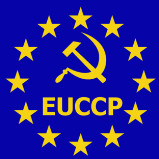 Because what we say is illegal in some places, and likely to ruin one’s career in many others, we have to be circumspect in how we construct and manage our networks of people committed to the cause.
Because what we say is illegal in some places, and likely to ruin one’s career in many others, we have to be circumspect in how we construct and manage our networks of people committed to the cause.As the implementation of the Treat of Lisbon proceeds, the work of the Counterjihad will become more and more difficult. If the Eurocrats have their way, what we do will have to go underground, and our work will of necessity become samizdat under the huge and eternal boot heel of the EUSSR.
What comes next?
One of the purposes of our meeting in Vienna was to move the center of gravity for our activities out of the United States and into Europe itself, among the people who will bear the brunt of Eurabia and who thus have the greatest incentive to resist it.
There will undoubtedly be more European workshops, and I (and other Americans) may well be involved. But action in a distributed network should be planned and executed close to where it is most needed and where it will be the most effective.
So keep your eye on the Europeans. I’ll be on the sidelines kibitzing, as usual.
But as to risings, I can tell you why.
It is on contradiction that they grow.
It seemed the best thing to be up and go.
Up was the heartening and the strong reply.
The heart of standing is we cannot fly.Links to this post:
The Death Penalty for Insurrection?
- The new dissidents of Europe…







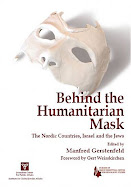


















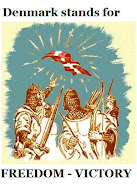


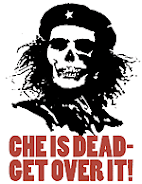


No comments:
Post a Comment